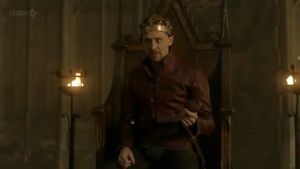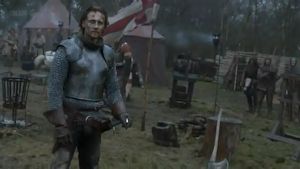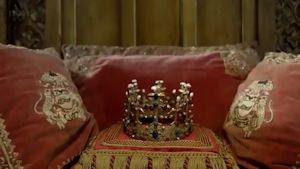TV Review: The Hollow Crown - Page 3
 | | Speaking of symbolism, here is King Henry holding one of the Dauphin's balls |
The edits also fall somewhere between "Richard II" and the two parts of "Henry IV." There are some unforgivable omissions--most notably the scene in which the King ensnares the three traitors before leaving for France--though the ludicrously long justification for the invasion is blessedly cut short. This episode keeps the action moving forward, never letting slow scenes go on too long the way they do in "Henry IV." Though I wouldn't call this the best film cut of the play (Branagh's version takes the cake, in my opinion), it is nonetheless the most accessible I've seen, and it manages to be uniquely clever in its approach.
That brings me to the acting. We know from "Henry IV" that Hiddleston is a brilliant Prince Hal, and the good news is that he is able to bring a lot of that performance to King Henry V. In fact, Hiddleston plays an inverted version of his previous role. As Prince Hal, he is wild and jovial with cracks of seriousness and sobriety, but as King Henry, he is serious and sober with cracks of wildness and joviality. He is introduced riding his horse through the forest as though care-free, and the issue of the glove near the end of the play is played by Hiddleston as though he were pulling another prank on Falstaff. Still, he spends the rest of the play on a war footing, proving to the world that he is no longer the Prince Hal they think he is, and Hiddleston, now sporting a goatee, is just as hard and intense as he needs to be.
Naturally, the big question of any actor who tackles the role is, "How good is his St. Crispin's Day speech?" Here again, the adaptation bucks convention by having Hiddleston deliver it only to his handful of commanders instead of having him shout it to all his men as a rallying call. I was deeply skeptical of this quieter and more personal approach at the start of the speech, but by the end, Hiddleston had me on the brink of tears. It's a very different, but no less effective, interpretation that proves that Hiddleston is capable of taking a place near, if not beside, both Olivier and Branagh. He's not the shouter those men are--all of Hiddleston's grand speeches are more subdued--but he has a piercing quality that is startlingly effective.
 | | The Battle of Agincourt is the climax of the entire series, and it does not disappoint |
He only falters at the very end, in the scene where Henry wooes Catherine. Though Hiddleston's Henry is more believable when he tells Catherine that he has no tongue for wooing, the scene in this adaptation can't compete with the chemistry between the young Kenneth Branagh and Emma Thompson. It's a tonally awkward scene, as it shows a side of Henry we haven't seen, and Hiddleston doesn't quite pull it off the way Branagh does. Mélanie Thierry, who plays Catherine, does a good job as the woman being wooed, but Hiddleston feels less genuine and more like a sleezeball hitting on a young woman.
Setting that aside, there are some other actors worth noting. Paterson Joseph does a great job with York, culminating in the best death scene in the entire series, and Anton Lesser manages to convey an impossible amount of information about Exeter through subtle sighs and half-smiles. The actors who play Pistol and Nim are almost impossible to understand due to their accents, but the scene in which the disguised Henry confronts Pistol on the eve of battle is nonetheless excellent.
As for the battle itself, it starts out relatively bloodless, only getting brutal once Henry orders the execution of the prisoners, a shocking and difficult turning point in the action. It is certainly more intense than Olivier's Battle of Agincourt, but it's not as bitter as Branagh's, in which the kids are mercilessly slaughtered. All in all, that's what this adaptation is like, neither as glorious as Olivier's nor as damning as Branagh's. It's almost antiseptic in its neutrality and strict adherence to Shakespeare's text, but Hiddleston's amazing performance, a big budget that is not wasted, and some incredibly well-framed shots save it from mediocrity.
Conclusions
 | | "Richard II" is not only the best episode of the bunch, but it also has the best crown |
The Hollow Crown proves you can be artistic with Shakespeare without being anachronistic or post-modern. It also proves that you need not highlight the places in which the plays reverberate today to have them be relevant, because they are, to use a cliché, truly timeless. Though the series certainly has its faults, the portrayal of Falstaff probably being the greatest, it's also quite deft and brilliant in bringing the Henriad to a new generation.
I have always bemoaned the fact that there hasn't been a great adaptation of Richard II, but I no longer have to make that complaint, because this version is by far the greatest. I will admit that the two parts of Henry IV have never been among my favorite plays, but they could be done well on the small screen (or even the big one). Alas, they are the weakest parts of this series. I understand the desire to make Henry IV more grounded than the two plays that surround it, but I wish the director had chosen to follow a more interesting path, borrowing from the directors of both Richard II and Henry V. As for Henry V, it is a fantastic adaptation that any fan of the play should watch, but it's hard to compete with the works of Olivier and Branagh.
At the end of the day, I think you should watch "Richard II" because it's fantastic, and I think you should watch the other three episodes because Tom Hiddleston is fantastic. You need not be familiar with Shakespeare to enjoy them--indeed, I'd love to go back and watch the entire series without knowing what will happen--but this is really more for audiences who know their English drama. I hope PBS gets this series on the air soon.
FINAL SCORE:





A beautifully shot and stirring series containing some great performances that are impossible to forget, The Hollow Crown only takes a handful of missteps.
|
-e. magill 1/29/2013
|
|